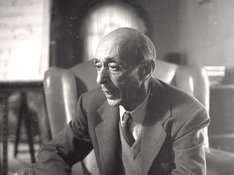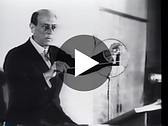Arnold Schoenberg in his own Words
I write what I feel in my heart - and what finally comes on paper is what first coursed through every fibre of my body.
I am but the loudspeaker of an idea. The idea is an electric current in the air. It may come from Jupiter - from the cosmos - that is not proven.
There is no such distiction as old and modern music, but only good music and bad.
David Bach, a linguist, philosopher, connoisseur of literature, and a mathematician, who was also a good musician was very influential in assisting me to become an upright straight-forward character whose ethic and morale furnishes the power of resistance against vulgarity and common-place popularity.
... I have been questioned whether certain of my compositions are "pure" twelve-tone, or twelve-tone at all. In fact, I do not know always. I am still more a composer than a theorist. And when I compose, I try to forget all theories, and I continue composing only after having freed my mind. (My Evolution)
Music is only understood when one goes away singing it and only loved when one falls asleep with it in one's head, and finds it still there on waking up the next morning.
I am the slave of an internal power more powerful than my education.
Great art presupposes the alert mind of the educated listener
Market value is irrelevant to intrinsic value. ... Unqualified judgment can at most claim to decide the market-value - a value that can be in inverse proportion to the intrinsic value.
My work should be judged as it enters the ears and heads of listeners, not as it is described to the eyes of readers.
I owe very, very much to Mozart; and if one studies, for instance, the way in which I write for string quartet, then one cannot deny that I have learned this directly from Mozart. And I am proud of it!
In my teaching I never sought merely ‘to tell people what I know’. Better to tell them what they did not know. Yet that was not my chief aim either, although it was reason enough for me to devise something new for each pupil. I labored rather to show them the nature of the matter from the ground up. Hence, I never imposed those fixed rules with which a pupil’s brain is so carefully tied up in knots. Everything was formulated as in instructions that were no more binding upon the pupil than upon the teacher. If the pupil can do something better without the instructions, then let him do so. But the teacher must have the courage to admit his own mistakes. He does not have to pose as infallible, as one who knows all and never errs; he must rather be tireless, constantly searching, perhaps sometimes finding. Why pose as a demigod? Why not be, rather, fully human?
To the astute readers this message is given. The only way to understand and enjoy modern music is to hear it as often as possible; hear, hear, hear it, a hundred times. That is the only way. The present generation is conservative and accustomed to certain scales, keys and chord combinations, so that their hearing has always been along these stereotyped lines. The new generation may “catch” the modern idiom, as they are not so hampered by precedent. But to understand modern music, one must study. It is a science to be investigated like any other.
I do not consider my music as atonal, but rather as non-tonal. I feel the unity of all keys. Atonal music by modern composers admits of no key at all, no feeling of any definite center. It is It is not, however, a matter of mathematics, for in music as in painting and in architecture it is a thing one feels rather than something one understands.
One of the major jobs ahead for creative musicians today is to try to teach the audience to hear contemporary music and of course to do this, the audience must have opportunities to listen to contemporary music.
In my teaching work I emphasize ear training. The music student needs most to learn to be correctly receptive. We cannot teach everyone to be a creative artist — that cannot be taught. But we can teach many people to be receptive listeners. What we need in all the arts, is a great number of good amateurs.
The big difference is that the progressive music of today is condensed. That is not to say that the ideas in the new music are better – the contrary may be true – but they are expressed more concisely, without repetition and elaboration.
The same principle of conciseness, condensation and simplicity applies, of course, also to modern literature and painting, as well as to music.
I like good popular music. I enjoy it for its entertainment but not when it is just a mechanical repetition of things that have been done over and over before: not just commercial mass production.
















